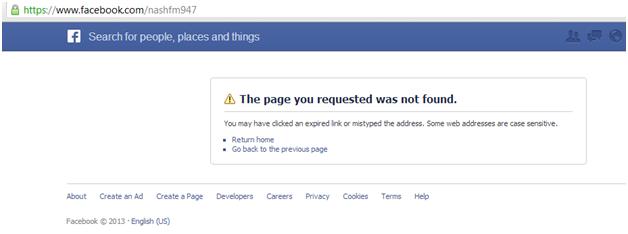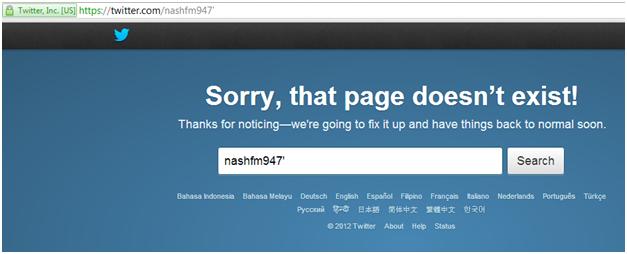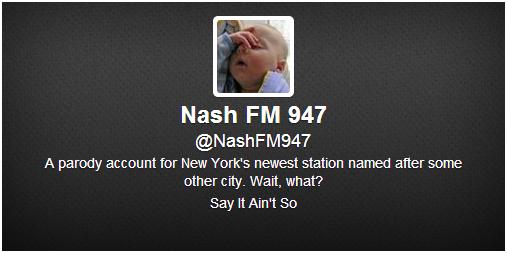 All the talk about the recent sign-on of Nash 94.7 has encompassed the notion of whether Country will work in New York City. There’s been a lot of noise about whether Manhattan, the boroughs, and the agencies will embrace some of the hottest music out there. The station did a fair amount of stunting, and by all accounts, pulled off a nice sign-on.
All the talk about the recent sign-on of Nash 94.7 has encompassed the notion of whether Country will work in New York City. There’s been a lot of noise about whether Manhattan, the boroughs, and the agencies will embrace some of the hottest music out there. The station did a fair amount of stunting, and by all accounts, pulled off a nice sign-on.
But the requirements for a new station debut have changed. Yes, you’ve got to have your music and/or hosts in place. The production has to be sharp, catchy, and clear. The sales people need a story and a narrative. You need a cool logo, matching stationery, and a van.
And you also need an effective social media strategy. And that’s perhaps where things might not have been as successful as many radio professionals think. Interestingly, social media still floats under the surface in radio. And that’s a problem in and of itself. We all watch the “center ring” to find out the new format and monitor the first hour. But the social activity of the audience, its comments and reactions, its ability to spread the word or give a thumbs-down to a new entrant in the field are all critically important, too.
Many broadcasters are still mailing it in socially, assigning these tasks to untrained people on the staff, and doing the bare minimum when launching a new station. In today’s guest post, Lori Lewis will tell you something you probably don’t know about the Nash FM sign-on from her very wizened social media perspective. There’s a cost to not planning out a smart, strategic social media game plan.
While most PDs and industry observers were streaming Nash FM at 9:47 a.m. last Monday. Lori was monitoring its social presence – and here’s what she discovered. – FJ
Anytime I hear about a station flip, I get excited. I wonder what the station will do socially to help them stand out, how they approach the debut on various platforms, and what radio can learn from the experience.
But what happened last Monday when Nash FM in New York signed on surprised me. There was a lot of industry hype in the trades for several days and speculation about the format. But when I checked them out at sign-on, I couldn’t help but conclude they got caught with their “social pants” down. To me, it was a loud cry that this social space is still not fully understood or accounted for – even when new stations launch in major markets. Because what happened to Nash FM could have happened to any new station.
Please note that what I am about to share with you is not about showcasing failure or is to make anybody look bad. In fact, we were initially going to keep this story to ourselves. But we thought it turned out to be a cautionary tale for station debuts of the future.
Last Monday morning after the launch, I looked up NASHFM947.com online just to check out their social assets and their strategy/approach.
They had a Facebook icon and a Twitter icon displayed right there on the homepage of their website.
When I clicked the Facebook icon, however, I got this:
So I moved on to Twitter, and when I clicked that icon, this popped up:
When I couldn’t access the NASHFM947 Twitter handle displayed on the website, I assumed it was some sort of coding issue on the back end. So I went to Twitter.com directly and searched for the handle they had displayed: NASHFM947.
I still couldn’t find it. Could it be the account hadn’t even been created?
To find out, I went to Twitter’s sign-up page anyway to act like I was going to create the @NASHFM947 handle. I really thought that this is where Twitter would inform me that name was already taken and there would just be some weird technical glitch for not being able to find it in search.
But when Twitter gave me the green light to create the account – that is, @NashFM947 was available – the same handle that is displayed on that radio station’s website – I just shook my head. They never secured the Twitter handle they planned to use (and were promoting?)
So I grabbed it.
Think about the damage a competitor could do with this.
Social Media needs to be trained like any other common core weapon system. It should be part of every station’s strategic arsenal, especially a new station.
Here’s why:
A typical fan’s digital behavior is to simply search for a station within their preferred platform.
And that’s what happened. People who tuned in the new station who are on Twitter immediately searched “NASH FM 947” in Twitter’s search bar and landed on my fake account.
And here’s what’s key – they didn’t even pay attention to how I described it:
The fans were just excited that this brand new radio station was on their favorite platform (Twitter) and what a rush that they could tweet this station in their moment of discovery.
As I watched fans find this account organically – and continued to choose to follow this fake account over the real NASH FM account that was finally created (@NASHFM947NY,) I deleted mine.
It was too creepy and scary to think that just anyone could have truly created chaos.
I don’t know the back story of how this happened – but I can tell you that Nash FM is not alone. As I said before, no one’s perfect and this could have happened to any station.
But there’s a pattern here. Too often in radio, the art of social media is pawned off to someone at the station who is deemed to have “social media knowledge” – you know, the person who always seems to be on Facebook. The thinking is that, they must know and understand the space so we’ll let them handle it.
But that’s like hiring a PD based on the fact the she listens to music all the time. It is no indicator of talent or knowledge of social media strategy. Not everyone has the sophistication, maturity, and common sense needed when launching and/or speaking in a brand’s singular voice.
Rick Webb, investor, co-founder and former COO of The Barbarian Group, put it best when he spoke last year on the need for real thinkers in the social space.
“Believe it or not, there are people out there actually figuring out some really complicated [beep!] for companies who need to radically transform their ways to deal with social media and this new world of constant two-way communication, and are smart enough to realize it.”
You no longer can simply sign-on a station based on the skill of your programmer and consultant. There’s more to launching a new brand than a fancy presentation for the sales department.
It looks like Nash FM will very likely be a successful venture. And this may be “just one of those things.”
No one’s perfect. This could have happened to any station. But in radio, it happens more than you think.
There needs to be a cogent, accountable social media strategy.
It’s a new day.







Hmmm. A New York station branded for a southern city that many, maybe most New Yorkers see as quaint, backward and possibly silly. That plays country music but has virtually no signal en Western Nassau and Suffolk Counties, where metro NY has its most concentrated core of country partisans. And no CP to improve that on file that I can find. With a plan to roll out a print MAGAZINE to support it – leveraging the fastest growing media…from a generation or two ago.
AND THEY LAUNCHED WITH NO TWITTER OR FACEBOOK PRESENCE. And were hijacked by someone. And all the top brass will no doubt hit their bonus targets this year. I love America!!!
Next steps? Lets have a robust discussion about whether Pandora is or isn’t radio. Followed by some lecture about how radio needs to get out and tell its story better. Will that story include the launch of Nash? Hope not 🙂
Dick, thanks for the comment. This could have happened to anyone, and that’s part of the issue here, too. Social is too important for it to become a tertiary priority. Appreciate you taking the time. At times, it’s a crazy industry in which we work.
Come on…are any of us really surprised by who let this happen?
I truly believe this is a universal problem – and it could’ve happened to anyone. That’s a big reason why we ran it. Thanks, Mark.
Hey Lori…why didn’t you grab their Facebook page, too?
This issue is not confined to radio. Too many businesses farm out their social media to an intern or the youngest staff member (because they’re always looking down at their smart phone). Few companies have an actual social media strategy. The mentality is generally “build it and they will come”. What is sad about this, though,is that Cumulus is in the COMMUNICATIONS business…
As we noted in the blog, Steve, it could happen to anyone. And I’m sure lots of broadcasters reading this post let out a sign of relief that it wasn’t them. Our intent was not to make anyone look bad but to bring attention to an industry unforced error that needs attention and correction. As Lori often writes, people often think that because social media is “free,” it’s therefore easy. And that couldn’t be farther from the truth. Thanks for commenting.
She couldn’t actually “grab” the Facebook Page because you need at least 25 fans to secure the URL. So if she created a page, she would then have to suggest the page to her friends first. Then once 25 have liked it, she could have attempted to grab the Vanity URL… too much work to make a point that was easily made with the Twitter example.
I think this was a great article. More operators and managers need to understand the importance of using these tools properly and effectively.
Thanks Lori!
Actually, as of April 2012 that restriction is no longer in place; you can create a new page and immediately claim the URL. Nevertheless, this was a great example showing the importance of being proactive with a well-defined social media strategy before something like a flip!
Exactly, Kurt – the need to incorporate social as part of the overall programming, sales and brand strategy has never been more important. Thanks for weighing in.
It depends what kind of page. I just tried to set up a “Company Page” (as it has been a couple months since I tried to set up a page) and I get this:
“Username: Your page needs at least 25 fans to have a username.”
However I did claim a username for a product I recently set up for my web hosting at https://facebook.com/viroozing
When I go to https://facebook.com/username and select my new page (Test) I get this:
“Test is not eligible for a username at this time. In the future, Test will be able to set a username.”
So the rules are always changing.
“The landlord” always sets the rules. Thanks, Charlie.
You’re right, Kurt. You can now claim the username immediately, without a set number of fans!
Stephanie, thanks. The rules keep changing with Facebook. This is even more reason to have your social game buttoned up before launch. Appreciate you chiming in.
Stephanie, I have to respectfully disagree… I cannot change the URL right away. I just tried setting up a new page yesterday and was not able to without 25 fans. Maybe it is because the rules are different for different Countries, as I am in Canada.
However, I did set up my Facebook account in 2006 when I was still living in the US and usually get the Facebook updates at the same time as the US. For example when they launched Timeline, I was here in Canada but got the update, where as my Canadian friends didn’t.
Thanks, Charlie. As you suggest, the intent was never to be subversive. Thanks for the kind comments and reading our blog.
This is a good observation but in the grand scheme of things, why does it matter? Radio stations rely on a handful of people with meters to tune into their station. They only need a few listening occasions from these people with meters to establish ratings. Ratings drive advertising revenues. If the station makes enough money, they’ll keep it running, if not, they’ll switch the format. It is highly unlikely that a botched social media launch will have any impact on listening occasions. If you were talking about online streaming radio, I can see it affecting the launch because you’re a click away. However, how many people sitting at their computer have a terrestrial radio within reach and a meter attached to their belt? Radio will always stick to what they do best – Radio. The change has to come in advertisers’ and agencies perceptions on the value of online radio advertising. If agencies and advertisers want online advertising and better social media integration, they would not look to a radio company. When that changes, and there is more money to be made, I’m sure radio stations will delegate social media duties to someone more qualified.
Gus, thanks for the comment. It depends on how you view radio and branding. If you’re playing a short game, it IS down to a handful of people. But if you’re playing a long game, it matters greatly. Building coalitions of energized consumers – or advocates – can do amazing things for a brand. At a time when most stations have essentially stopped marketing, social media becomes a viable way of spreading the word and building audience. Appreciate you reading our blog.
No argument there, but a botched social media launch is very much a short game thing and very fixable. If you’re talking long game, they have plenty of time to correct that mistake. No harm no foul. Looks like their pages are up and running and doing pretty well – almost 5,500 facebook followers in 4 days – not bad for radio. Also, alot of the time stations have the hosts do the posting in real time. I wouldn’t consider that an unqualified social media person just because that’s not their main job. People get off on the fact that the personalities that they love actually communicate with them via facebook and twitter. That’s where radio actually does very well from a social media aspect.
I disagree with this comment. For one thing, many advertisers now have sophisticated social media strategies. I see even small, local businesses which do a great job of communicating with customers on Facebook, Twitter and Pinterest. When radio ignores social media it contributes to the perception that the medium is no longer a vital part of the media landscape.
Agree, Denise. It is a sign that brands care enough to connect with and listen to its audience. And you’re right – we make ourselves and our brands look bad when we don’t make an effort to engage in this space Thanks for taking the time.
I’m talking about online ads with radio companies. Advertisers and agencies alike do not rely on radio companies for online advertising. They go to them for radio because that is what they do best. Radio companies lack the technology and online platforms to compete with online ad networks that offer insane targeting, smart ads, weather triggered ads etc. Radio does enough with their radio personalities on social media for them to keep listeners loyal and interactive. I’m simply saying that the social media issues in the first day will have no effect on the new station and would be more likely to effect online radio unique numbers due to a lack of social media directing listeners to their online stream. and that effect would be extremely short term.
Point taken, but the larger point isn’t about day one – it’s about radio brands mapping out strong radio strategies and staying on plan as they would a programming or sales goal. As for streams and online ads, it’s a topic we have covered here many times. We are attacking it head on in our Techsurvey9 and we’re hoping to have strong new data in the spring. Thanks, Gus.
What a whiff. Regardless of the stick and the history of Country in New York. They are the only Country station in NYC and they will have a passionate audience. It is a natural for Social Media. Why can’t radio see the forest through the trees. They are a targeted (still large) medium that focuses on lifestyles. i would love to write video shorts for them alll day. And why with an audience, staff and advertisers…doesn’t radio have marketing websites and Inbound marketing tactics in place. There are lots of SAAS based software to help. They would make a lot more money.
I say this out of love, I spent a lot of years in Radio and still care about the biz and the people. Why are they so arrogant? Dave Presher
Dave, thanks for the passion-filled response. I think it is less arrogance and more the bubbling under realization that there needs to be more attention paid to a social strategy – not just programming and sales issues. This is a very traditional industry and change often comes hard. But given that social media is no longer a hobby but part of the lifestyle ought to elevate its presence in every media company in America – including radio companies. Thanks for chiming in.
Fred & Lori- GREAT post and great message and couldn’t agree more that having a strategic Social Media gameplan is one of the most important things a radio station/broadcasting group needs to have in place today….and even more so with a new station sign on…in NYC (!!!!)… Really have to weigh in on the ‘short’ vs ‘long’ scenario…what brand has a business model and strategy built on the short term, and in today’s mobile ‘plugged in world’ wouldn’t you also think they’d also want to have a live stream and free app available simultaneous with the launch, all with traffic drivers (links) that drive tune in and traffic to their website and social media (oops, that’s right, they don’t have any…) platforms? You guys were spot on in the blog today- kudos! Best- G
Greg, most appreciated. Thanks so much for reading the blog & commenting.
This was a great read. It still blows me away how some stations do not take social media strategy more serious. Social networking is a MAJOR entity in today’s digital age.
Yes, a competitor could have grabbed this Twitter handle and basically made the brand look extremely bad. Hell, anyone could have.
I think stations need to wake up and acknowledge that social media is here to stay and not addressing its importance is likely to deal an enormous blow to any station or company.
Dominique, great to hear from you – it’s been too long. Thanks for contributing.
Lori’s wasn’t the only “unauthorized” Nash-FM Twitter account – One called @947nashfm was set up BEFORE the radio station launched. I discovered it over the weekend while reading industry-insider speculation about Cumulus Media’s plans for the station and its trademarking of the “Nash-FM” brand.
@947nashfm was just quietly sitting there, with no tweets, and I thought, “Aha, they’re ready for the launch!” The account sent its first tweet just as the station made its debut at 9:47 Monday morning, and the tweet echoed the first song played: “This Is How Country Feels In New York.” Seemed authentic!
But after several minutes I noticed the station’s web page displaying @nashfm947ny – and also noticed that @947nashfm was sending mildly snarky tweets (“And you thought we were going Alternative?” “Drive your truck through Brooklyn with NashFM”). At that point I realized it was a parody account – but already it, like Lori’s, was receiving congratulatory tweets from country music fans.
Again, luckily for Nash-FM, whoever is behind @947nashfm isn’t malicious – it soon began to identify itself as a parody account and even sent a tweet offering to turn over the account to the station (which apparently didn’t respond).
Part of the reason for this social-media stumble might be the extreme secrecy that Cumulus put on the launch. It may have made a deliberate decision NOT to open social media accounts ahead of time because it was trying to keep its Nash-FM plan under wraps until the official unveiling. It even put the call letters WRXP – previously used by two alternative-rock stations – onto 94.7, apparently just to confuse everyone who was speculating about what the new format would be. (It reportedly will switch them again to WNSH next week.)
Dan, thanks for filling in the blanks. It still boils down to gaming it out, having a strategy, staying on message, considering what could go wrong, and great execution – all in the social media arena. There are obviously a lot of Country fans in the area looking to connect and commune. And as you and Lori pointed out, the competition did not have a counter strategy ready to go. There’s a whole other battle that plays out socially and this incident serves as a fascinating example of what we can expect from future sign-ons. Thanks for reading our blog.
I’m kind of late to the party on this – but I agree that while this was a surprising set of screw ups, they won’t have any serious impact a year from now on how well the station does.
I disagree with one point – that this could have happened to anyone. Knowing enough to embed social media links but not knowing enough to have them active with a planned and defined strategy strikes me as poor planning. Detailed punch-lists or flow charts with tasks, due dates and some way of showing how they are interrelated is a part of any launch like this. Some one, or some “ones” messed up IMO.
Bob, the party is still raging on, so thanks for weighing in. The damage could have been longer lasting had malicious competitors taken advantage of the misstep. And your buttoned up philosophy is correct – there should have been lists in place to prevent this from happening. But too often, radio teams get so caught up with the “big boulders” – the music, the production, etc. – that they miss key details that need to be addressed. Back in the day, how many stations forgot to change their “slogan file” with Arbitron, thus missing out on ratings credit? In many ways, these social faux pas are very much the same. When they are not top priorities and/or they are delegated down the pecking order, mistakes will happen. Thanks again.